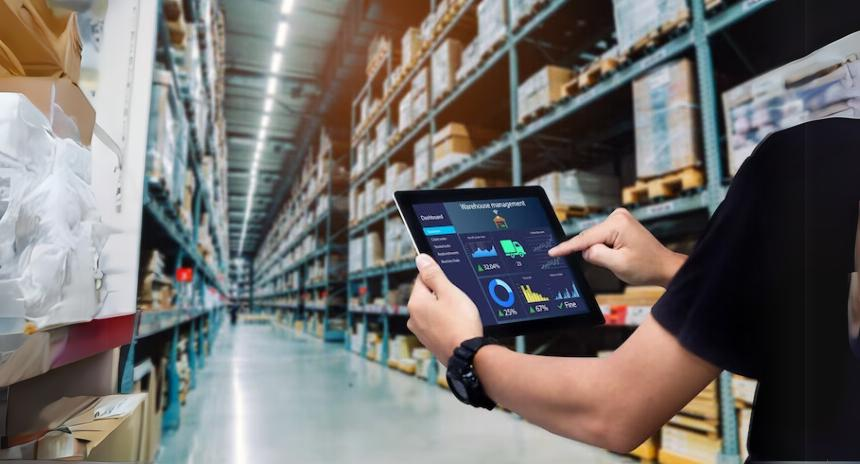
Online Accounting software supplies companies with an easy-to-use, cost-effective method of automating analysis and bookkeeping duties, preventing costly mistakes, and saving time on labor-intensive financial tracking systems.
An introduction:
Preferring the right type of accounting software counts greatly for efficient procedures in the ever-changing wholesale and distribution industry. The advent of cloud-based solutions and online accounting software has fundamentally altered how these associations run inventory and accounts. Picking the right platform can greatly impact effectiveness, precision, and efficiency. The individual needs of wholesale businesses make accounting software developed to address complex inventory management essential. This preface delves into the crucial factors to consider when choosing the ideal online accounting software. It stresses the importance of cloud-based solutions for smooth integration, immediate wisdom, and improved management of finances in the ever-changing wholesale and distribution industry.
Miracles of wholesale and distribution accounting software
The proper accounting software is critical for wholesale and distribution companies since it provides many edges that increase operational effectiveness. These outlets offer strong inventory management implements that allow for real-time tracking of stock levels, lowering the possibility of overstocking or stockouts. Improved invoicing and financial reporting precision expedites procedures, assuring adherence to regulations and reducing mistakes.
Routine task automation releases workers’ time and resources so they can concentrate on key corporate obligations.
In a modern, fast-paced company climate, cloud-based accounting software promotes flexibility by enabling remote access to vital data. Integration with other corporate systems also improves decision-making and overall visibility. Using appropriate accounting software, distribution and wholesale businesses can achieve long-term growth and effective financial management.
Main components of Accounting software for wholesale and distribution functions
1. Billing consumers and assembling invoices
Even the most basic Software for wholesale management should retain a component for completing invoices that allows you to apprehend consumers and clients for your products and services. You should be able to take consumer payments through the invoice with the program. It should be able to process ACH and debit card expenses, among other payment scenarios.
Certain accounting schedules include more cultured features like batch invoicing, automatic periodic invoicing, and automatic late payment charges.
2. FBR integration
Integrating cloud-based accounting and inventory management software with the Federal Board of Revenue (FBR) system is a noteworthy benefit that enables users to quickly and simply confirm tax contributions. making use of the software’s unique QR codes and invoice numbers.
3. Financial reporting
The ability to develop the following three essential accounting reports should be incorporated into any accounting software:
- A profit and loss account also called a pay statement, lists all of the revenue and outlays for your company for an exact time frame.
- A cash flow statement that portrays your company’s inflow and outflow of funds.
- A balance sheet supplies an overview of your company’s assets, weaknesses, and shareholder equity at a particular time.
The economic status of your business is vitally announced to you and other stakeholders (such as banks and lenders) by these three accounting reports taken concurrently. The data in these papers is used by shareholders, executives, and industry owners to plan for a more successful future, decrease costs, and maximize earnings.
4. Tracking expenses and scanning receipts
A wholesale and distribution software should allow you to document other costs, such as worker expenses for repayment, and link to bank accounts to import and organize your bank transactions in real time. Online Accounting software typically allows for the scanning and uploading receipts in total time, delivering you constant entrance to up-to-date financial records.
Actions to take into account when picking the best accounting software
The following are important factors to take into chronology while selecting the best accounting software:
- Recognize the demands of your industry: For an efficient software selection process, choose your accounting necessities, desired features, mechanization degree, and scalability.
- Consider add-ons and integrations: Verify that the program works with your existing designs, and look into serviceable add-ons.
- Explore how user-friendly it is: Select Software comfortable with tutorials, a user-friendly interface, and dependable customer support.
- Verify adherence and regulations: Verify the software’s industry-specific compliance and regulation needs by checking compliance and regulations.
- Specify your spending limit: Examine the attributes, price, and support of several wholesale and distribution software to decide which best suits your needs.
Why Professional accounting software is far better than manual accounting for wholesale and distribution business
● Swiftness and speed
The primary benefit of accounting systems is their speed. In addition to processing data and producing reports far more quickly than manual systems, accounting software enables quicker data entry. Computerized accounting will save you a great deal of time by facilitating the timely and accurate collation and printing of documents like purchase orders, payroll, and invoices.
● Accuracy
Accounting details from the company’s books must be mathematically verified by professional and educated accountants, which is an uphill task in day-to-day manual accounting. Subtle mistakes like switching around numbers or typing data in the wrong column can lead to serious blunders. Conversely, by producing precise financial reports, accounting systems enable accountants to process more data than previously. Automatic accounting systems save time and enhance cash flow by facilitating better product control and payment collection. They are also very efficient and user-friendly.
● Automation
Resembling online accounting to manual calculation, the latter is far more laborious. You must physically write in the numerals, double-check your work, and add cues precisely. Motorized systems update records automatically and efficiently manage these ordinary duties on the road. Software programs complete all measures automatically, reducing errors and maximizing efficiency.
Conclusion
In the climax, wholesale institutions can be satisfied by cloud-based accounting software’s accessibility, affordability, scalability, computerized upgrades and backups, enhanced security, integration opportunities, and time-saving features. These advantages allow distributor associations to concentrate on promoting growth and triumph while streamlining their finance processes and making wise selections.
